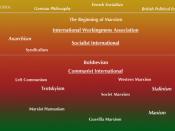This historical connection of Marxist theory with conflict theory presents an interesting paradox of a Marxism reared in the womb of theoretical structures to which it was, and is, seemingly largely opposed. Marxist theory has in common with conflict theory an interest in explaining both law and criminal justice but rejects the multi- group conflict image of society and endorses a power- elite model of society, in which social, economic, and political power has been concentrated into the hands of a small ruling class in late-stage capitalism. The history of 'civilized' society, for Marx, has been the history of different forms of class exploitation and domination. It is the form of class domination present which determines the general character of the whole social structure. For example, the growing of wheat using traditional, non-mechanical techniques is compatible with a wide range of social relations of production. A Roman citizen often owned slaves who worked his land growing wheat; a feudal lord would seize the surplus wheat grown by the serf on the lands; the early capitalist farmers began to employ landless laborers to do their manual work for a wage that was less than the total value of the product that they created.
In each case, wheat is grown on land by the labor of men and women, but the social arrangements are totally different. There are totally different class relationships, leading to totally different forms of society: ancient, feudal, and capitalist. The one thing that unites these three arrangements is that in each case a minority class rules and takes the surplus away from the producers. Each society, says Marx, embodies class exploitation based on the relationships of production, or rather, the modes of production. The key to understanding a given society is to discover which is the dominant mode...



G-gal.
Good essay; informative.
0 out of 0 people found this comment useful.